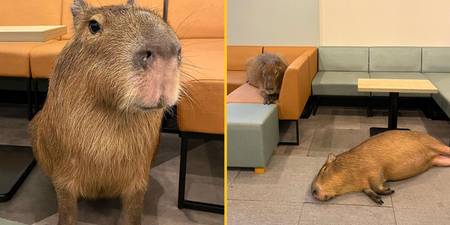Scientists have identified the specific gene that divided domesticated dogs and wolves.
Animal researchers have finally identified a genetic difference that turned some wolves into man’s best friend. The gene could solve the mystery as to why some pack canines began to interact with humans, while others stayed wild.
The breakthrough discovery, published in the journal Science Advances, provides a whole new understanding of the split between dogs and wolves that began thousands of years ago, says Monique Udell, an animal scientist at Oregon State University and lead co-author of the study:
“The genetic basis for the behavioural divergence between dogs and wolves has been poorly understood, especially with regard to dogs’ success in human environments. It was once thought that during domestication dogs had evolved an advanced form of social cognition that wolves lacked.”
This is the first time animal researchers have integrated both behavioural and genetic information to understand the molecular underpinnings of changes that led to domesticated dogs becoming man’s best friend.
Using molecular tools, geneticists led by Princeton University biologist Bridgett vonHoldt discovered that dogs have the same genetic markers that are found in people with Williams-Beuren Syndrome, a disorder characterised by developmental delays and ‘hyper-social’ behaviour.
In the study, the research team evaluated human-directed sociability of 18 domesticated dogs and 10 captive human-socialised grey wolves using sociability and problem-solving tasks.
The dogs and wolves were given a solvable task with a person present: open a puzzle box containing a sausage within two minutes. The dogs were more likely to gaze at the person and not persist in the task. The wolves were more likely to persist in the task and solve it, even if a person was nearby.
The researchers then conducted a second test. They had a person sitting down inside a marked circle in an active phase and a passive phase.
In the active phase, the person called the animal by name and actively encouraged contact while remaining in the circle.
In the passive phase, they sat quietly and ignored the animal by looking down on the floor. Both the dogs and wolves were quick to approach the people, but the wolves tended to wander away after just a few seconds. The dogs persisted for a long period of time with both familiar and unfamiliar people.
Udell, director of the Human-Animal Interaction Lab, explains that the team also gathered blood samples from the animals for genetic testing:
“This new evidence suggests that dogs have a genetic condition that can lead to an exaggerated motivation to seek social contact compared to wolves. We’ve done a lot of research that shows that wolves and dogs can perform equally well on social cognition tasks.”
But, Udell says, it seems our canine companions just can’t get enough of hanging out with us.
“Where the real difference seems to lie is the dog’s persistent gazing at people and a desire to seek prolonged proximity to people, past the point where you expect an adult animal to engage in this behaviour.”
LISTEN: You Must Be Jokin’ with Aideen McQueen – Faith healers, Coolock craic and Gigging as Gaeilge




















































